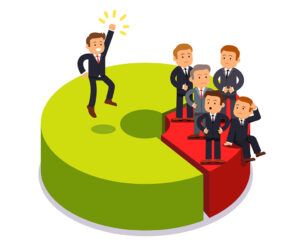 Groups that sprouted from the same organization often act toward each other as if they were with competing political parties. You may find that the leader and members of another group are obstructing, rather than helping, your group do its job. If this happens, it will be helpful for you to know why groups tend to conflict and how they can reconcile their differences.
Groups that sprouted from the same organization often act toward each other as if they were with competing political parties. You may find that the leader and members of another group are obstructing, rather than helping, your group do its job. If this happens, it will be helpful for you to know why groups tend to conflict and how they can reconcile their differences.
A. Reasons for Inter-Faction Conflict: Possible Causes of Competition Leading to Division
• Interdependency
When groups depend on each other to get their work done they get frustrated when things go wrong and tend to blame the other party for the problems that exist.
• Limited resources
When groups do not have enough resources or funds to get their project done, competition between them for those scarce resources becomes likely.
• Independent rewards
When groups are rewarded only on the basis of their own accomplishments, the organization is reinforcing the thought that they must struggle against each other rather than cooperate with one another.
• Different goals
When groups’ goals differ—for example, one party is focused on selling tickets or holding dinner and dance parties to fundraise for the purpose of raising campaign funds for sending less fortunate children to school through a scholarship program, whereas the other group wants to put money into starting up a business cooperative—their inharmonious goals will generate conflict.
• Different time periods
When one group is concerned with meeting short-term deadlines and another group pays more attention to long-range achievements, they are each likely to see the other as ignoring or obstructing their own initiatives and efforts.
• Different perceptions
When a party gets partial and distorted information about what another party does, it will often misunderstand and misjudge the other group’s actions.
• Status incongruity
When one political party gets more credit or rewards for its work than another party, resentment between them will grow.
Please do not forget that knowing the causes of inter-faction conflict is a step forward to alleviating it.
B. Possible Solutions for Inter-Faction Conflict
When your group and other groups in a political party begin to develop negative stereotypes about each other and feel pleased when other groups fail, you and the leaders of the other parties need to intervene. To rebuild harmony and cooperation, we can do this by decreasing competition. People who feel they are working on the same side of the line are less likely to feel competitive. Unity and harmony are built by:
• Emphasizing the common enemy
Opposing parties unite when they recognize that they are facing a threat bigger than them. When members realize that they face the danger of losing their good reputation and fame of their own group to competing fraternities, they are motivated to rally together and compromise their differences—which usually seem minor in the big picture.
• Increasing cooperative rewards
When the hierarchy provides recognition to both groups equally and when it rewards each group on the basis of how well they mesh their work with the work of the other group, both groups are encouraged to unite and cooperate.
• Task Force Meeting
Representatives from each group or party should meet periodically to plan and discuss progress made on specific projects involving the two tending-to-separate groups.
• Reducing inter-group distance
Arrangements are made for groups that are interdependent to work as close to each other as possible so members can readily communicate and reach each other immediately when problems arise. Every opportunity taken to emphasize that the two parties have more to gain by cooperating than by competing and to help them get to know each other well would surely help in resolving inter-group or inter-political conflict. Cooperation is the stronghold of unification. Unification proceeds from perspiration. We perspire to inspire!


